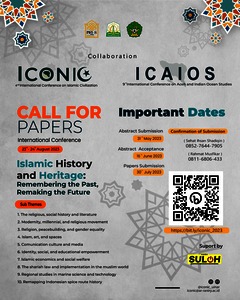Özay, Mehmet (2023) Koeli kontrak and systemic changes inquiries: an advocacy of Mohd. Said against Dutch Capitalist Economy. In: «Islamic History and Heritage: Remembering the Past, Remaking the Future», 23-24 August 2023, Banda Aceh, Indonesia. (Unpublished)
|
PDF
Restricted to Repository staff only Download (387kB) |
||
![[img]](http://irep.iium.edu.my/106396/3.hassmallThumbnailVersion/FLYER.jpg)
|
PDF
Download (521kB) | Preview |
|
|
PDF
Download (467kB) | Preview |
|
|
PDF
Download (537kB) | Preview |
Abstract
This study puts its emphasis on koeli kontrak known literally slave contract which can be translated neutrally labor contrak. While the colonial process is related much political sovereigny issue, in fact it was much considerably in line with economic exploitation which no doubt had a human side of it. With this regard, koeli kontrak is a major subject yet to be tackeld accordingly. However, this study focuses on this subject in the perspective of ideological stance of Mohd. Said as a reporter, journalist, advocate or activist and writer in his late ages. Koeli kontrak based on my observation seems to be highlighted by his own book published by the same title in 1977. This paper briefly probes the emergence of the labor class (koeli kontrak) structured by Poenale Sanctie during the Dutch colonial rule and the analytical approach of late H. Mohd. Said as a journalist and intellectual about this policy. Mohd. Said advocated that the labor class employed in plantations in North Sumatra was in a position not to defend themselves against the corporators and employers. They were bound to specific strict rules written on their contracts which they were signed at the initial stage of their employment. His advocacy of the labor class in their unbearable conditions in North Sumatra is observed in his constant writings and activities. I argue that his intellectual stance contributed to the awareness and consciousness processes of the indigenous people who were forced to work under the territorial expansion of colonial rule in the Archipelago about their rights. The emergence of the plantation venture with the corresponding extension and expansion territorially of the Western European countries led to their political domination felt heavily by the indigenous people. This process became a medium for the exploitation of the indigenous people since they were forced to a lesser or more significant extent to be a labor class corresponding to the extension of European domination. On the other hand, this process also caused the emergence of awareness and consciousness about justice among the educated class, including journalists and literary circles. The operation of the plantation industry was initiated in the second part of the 19th century and improved significantly because of the global demand for this valuable product throughout the decades till WW2. However, there were injusticeseness employed by the investors and plantation owners towards their employees with time. This became a severe social and political phenomenon at the beginning of the 20th century. The Dutch plantation owners felt the unrest among the employees, and he announced this in a few newspapers to take measures towards unprecedented developments based on his interest. There are two aspects of Poenale Sanctie in the eyes of Mohd Said. The first represents the capitalistic values implemented in the plantation business, such as tobacco (tembakau) and rubber (karet). Moreover, this was supported by Dutch rule and capitalist investors. The value of Poenale Sanctie seems to have been justified by the economic benefit of the plantation business at the international level. The second is Poenale Sanctie became a tool to be injustices through the rights of the employers above their employees or labor force. They had enough rights to conduct hegemonic rights to enforce the labor beyond their personal rights and work ethics. Mohd. Said was a political critique of his society which was molded by the power of colonial rule, which I propose to name the “colonial condition,” which includes internal and external factors. He was very sharp and strongly criticized the unjust system during the blooming of export crops through plantation systems empowered by internal and external colonial conditions. Mohd. Said adhered to the justice system and had a critical perspective towards the groups, either foreigners or natives, who seemed responsible for the injustices applied in the plantation sector. Here I have considered Mohd Said’s writings about Kolie Kontrak. With this regard, this study can be classified as a sample of micro-sociology because it departs from the approach of a general trend of conventional historiography by absorbing facts concerning grand political events and episodes. Nevertheless, I aim to penetrate the personal level of intellectual contribution and struggle in the example of Mohd. Said here.
| Item Type: | Proceeding Paper (Keynote) |
|---|---|
| Uncontrolled Keywords: | Poenale Sanctie, koeli kontrak, colonial economy, Mohd. Said, nationalist awareness. |
| Subjects: | H Social Sciences > HN Social history and conditions. Social problems. Social reform |
| Kulliyyahs/Centres/Divisions/Institutes (Can select more than one option. Press CONTROL button): | International Institute of Islamic Thought and Civilization (ISTAC) |
| Depositing User: | ASSOC.PROF MEHMET ÖZAY |
| Date Deposited: | 14 Sep 2023 17:03 |
| Last Modified: | 16 Oct 2023 15:58 |
| URI: | http://irep.iium.edu.my/id/eprint/106396 |
Actions (login required)
 |
View Item |


 Download Statistics
Download Statistics Download Statistics
Download Statistics